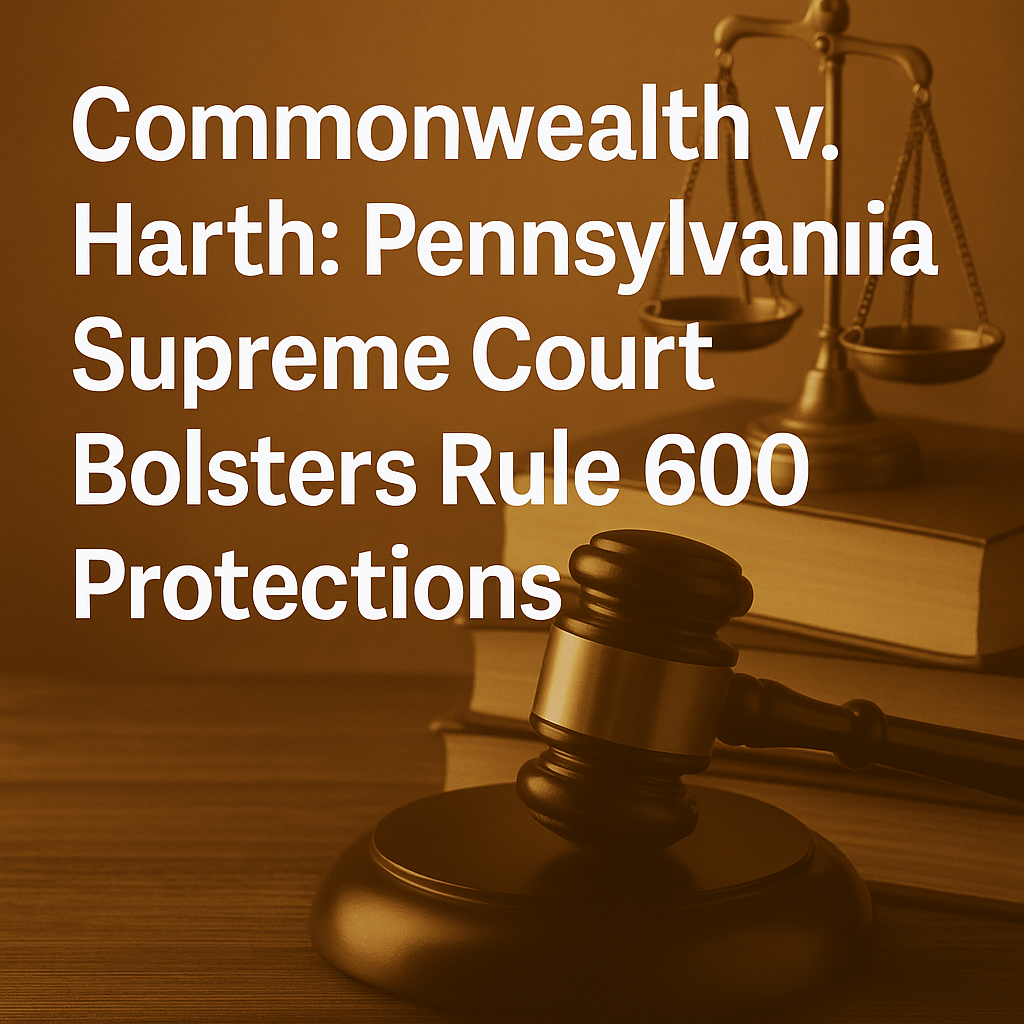When Justice Is Delayed: What Commonwealth v. Harth Means for Rule 600 and the Right to a Speedy Trial in Pennsylvania
June 7, 2025

The right to a speedy trial is a foundational protection in criminal law, designed to prevent individuals from languishing in legal limbo while the government prepares its case. In Pennsylvania, this right is enforced through Rule 600 of the Pennsylvania Rules of Criminal Procedure. A recent landmark case—Commonwealth v. Khalid M. Harth, 252 A.3d 600 (Pa. 2021)—clarifies just how strictly this rule must be applied and what prosecutors must do to avoid having criminal charges dismissed.
This decision has serious implications for defendants whose cases are delayed by discovery issues, court congestion, or prosecutorial inaction.
Understanding Rule 600: Pennsylvania's Speedy Trial Rule
Rule 600 requires that a defendant be brought to trial within 365 days of the filing of the criminal complaint. If that deadline is missed, the defendant may file a motion to dismiss the charges, unless:
The delay was caused by the defense, or
The Commonwealth can prove it acted with due diligence and the delay was beyond its control.
Due diligence means that prosecutors must take all reasonable steps to move the case forward, including timely discovery production, subpoenaing witnesses, and preparing for trial.
The Background of Commonwealth v. Harth
Khalid Harth was arrested and charged in January 2015 for crimes stemming from a home invasion. However, his trial did not begin until November 2016—nearly two years later. During that time, there were repeated delays, many of which were caused by the prosecution’s failure to turn over discovery.
Despite the prolonged timeline, the trial court denied Harth’s Rule 600 motion to dismiss, citing “judicial delay” due to court scheduling and other unrelated trials. The court did not require the prosecution to explain or justify the delays. The Superior Court agreed and affirmed.
But the Pennsylvania Supreme Court reversed, holding that the trial court and prosecution had failed to comply with the strict requirements of Rule 600.
The Supreme Court’s Ruling: Due Diligence Before Judicial Delay
The key takeaway from the Court’s opinion is this:
Before a trial court can exclude time based on “judicial delay,” the Commonwealth must first prove that it acted with due diligence throughout the life of the case.
This represents a clear shift in how Rule 600 is to be interpreted and applied. Prosecutors can no longer passively rely on crowded court dockets or vague scheduling issues. They must affirmatively demonstrate that every delay was either out of their control or not their fault—and they must do so with evidence, not assumptions.
The Court went further: because the prosecution had already been given two opportunities to prove due diligence and failed, the Court held that Harth was entitled to have his charges dismissed with prejudice. No remand, no do-over. The case was over.
Key Lessons from the Decision
Discovery delays matter. When the Commonwealth fails to turn over required evidence in a timely manner, that delay is attributed to them—not to the court, not to defense counsel.
The burden is on the prosecution. At every stage, the Commonwealth must be prepared to show it did everything reasonably possible to bring the case to trial.
Judicial delay is not a catch-all excuse. Even if the court is unavailable, the prosecution must first prove it was trial-ready.
Rule 600 is enforceable. If the 365-day deadline is missed without valid justification, the proper remedy is dismissal.
Applying Harth in Practice
For criminal defendants in Pennsylvania, Harth is a powerful precedent. It confirms that prosecutors must be held accountable for delays and that the constitutional right to a speedy trial cannot be brushed aside by blaming court calendars.
When filing a Rule 600 motion, defense attorneys should:
Rigorously track all dates from the criminal complaint to the present;
Document each delay and its cause;
Identify any outstanding discovery issues;
Emphasize the prosecution’s lack of readiness or failure to communicate.
Harth also underscores the importance of pushing back when courts improperly shift the burden to the defense. The law is clear: the Commonwealth must prove it acted diligently. If it cannot, the defendant is entitled to relief.
Conclusion
The Pennsylvania Supreme Court has made it clear: Rule 600 has teeth. Prosecutors must respect it, courts must enforce it, and defendants should use it. Commonwealth v. Harth isn’t just a procedural case—it’s a resounding affirmation that due process and accountability matter.
If more than a year has passed since criminal charges were filed and the case still hasn’t gone to trial, a Rule 600 motion could make the difference between a conviction and a complete dismissal.
